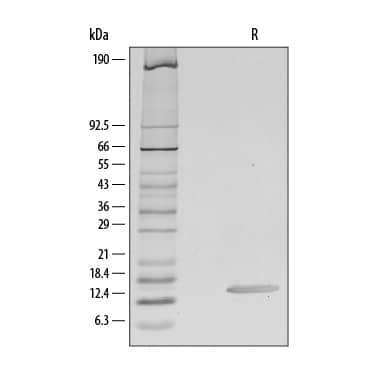Recombinant Human CCL28 Protein
R&D Systems, part of Bio-Techne | Catalog # 717-VC

Key Product Details
Product Specifications
Source
Ile23-Tyr127
Purity
Endotoxin Level
N-terminal Sequence Analysis
Predicted Molecular Mass
Activity
The ED50 for this effect is 0.4-2.0 µg/mL.
Scientific Data Images for Recombinant Human CCL28 Protein
Recombinant Human CCL28 Protein Bioactivity
Recombinant Human CCL28 (Catalog # 717-VC) chemoattracts the BaF3 mouse pro-B cells transfected with mouse CCR10. The ED50 for this effect is 0.4‑2.0 μg/mL.Recombinant Human CCL28 Protein SDS-PAGE
1 μg/lane of Recombinant Human CCL28 was resolved with SDS-PAGE under reducing (R) conditions and visualized by silver staining, showing a single band at 14 kDa.Formulation, Preparation and Storage
Carrier Free
What does CF mean?CF stands for Carrier Free (CF). We typically add Bovine Serum Albumin (BSA) as a carrier protein to our recombinant proteins. Adding a carrier protein enhances protein stability, increases shelf-life, and allows the recombinant protein to be stored at a more dilute concentration. The carrier free version does not contain BSA.
What formulation is right for me?In general, we advise purchasing the recombinant protein with BSA for use in cell or tissue culture, or as an ELISA standard. In contrast, the carrier free protein is recommended for applications, in which the presence of BSA could interfere.
Carrier: 717-VC
| Formulation | Lyophilized from a 0.2 μm filtered solution in PBS with BSA as a carrier protein. |
| Reconstitution | Reconstitute at 25 μg/mL in sterile PBS containing at least 0.1% human or bovine serum albumin. |
| Shipping | The product is shipped at ambient temperature. Upon receipt, store it immediately at the temperature recommended below. |
| Stability & Storage | Use a manual defrost freezer and avoid repeated freeze-thaw cycles.
|
Carrier Free: 717-VC/CF
| Formulation | Lyophilized from a 0.2 μm filtered solution in PBS. |
| Reconstitution | Reconstitute at 100 μg/mL in sterile PBS. |
| Shipping | The product is shipped at ambient temperature. Upon receipt, store it immediately at the temperature recommended below. |
| Stability & Storage | Use a manual defrost freezer and avoid repeated freeze-thaw cycles.
|
Background: CCL28
Human CCL28 (CC chemokine ligand 28) is a novel CC chemokine identified by TBLASTN searches of the Human Genome Systems (HGS) and Genbank dbEst database using a human chemokine consensus sequence. Human CCL28 cDNA encodes a 127 amino acid (aa) residue precursor protein with a putative 22 aa residue signal peptide that is cleaved to produce the 105 aa residue mature protein. Human and mouse CCL28 are highly conserved, sharing 83% aa identity in their mature regions. Among CC chemokines, CCL28 shares the most homology with CCL27/CTACK. The mouse CCL28 gene has been mapped to the distal region of chromosome 13. Human and mouse CCL28 RNA expression was found to be highest in normal and pathologic colon with the protein being expressed by epithelial cells. Human CCL28 RNA was also present in normal and asthmatic lung tissues. The receptor for CCL28 has been identified as the CCR10 (GPR2 orphan receptor) which is also the receptor for CCL27/CTACK.
References
- Wang, W. et al. (2000) J. Biol. Chem. 275:22313.
Alternate Names
Gene Symbol
UniProt
Additional CCL28 Products
Product Documents for Recombinant Human CCL28 Protein
Product Specific Notices for Recombinant Human CCL28 Protein
For research use only

